With the advent of social media, fad diets have taken on a life of their own, having the ability to go viral almost overnight. So, it’s no surprise that we’re seeing more and more fad diets gaining traction. Amongst the recent crop of diets, the hard-boiled egg diet has been heavily promoted as a way to lose weight fast.
Eggs are one of the most healthy foods. As a result, a diet built around the humble egg may sound like a good idea. Its advocates claim you can lose up to 20 pounds on the egg diet in two weeks. So, does it really work?
Read on for the most complete analysis of the hard-boiled egg diet you will ever need.
What is the Hard Boiled Egg Diet?
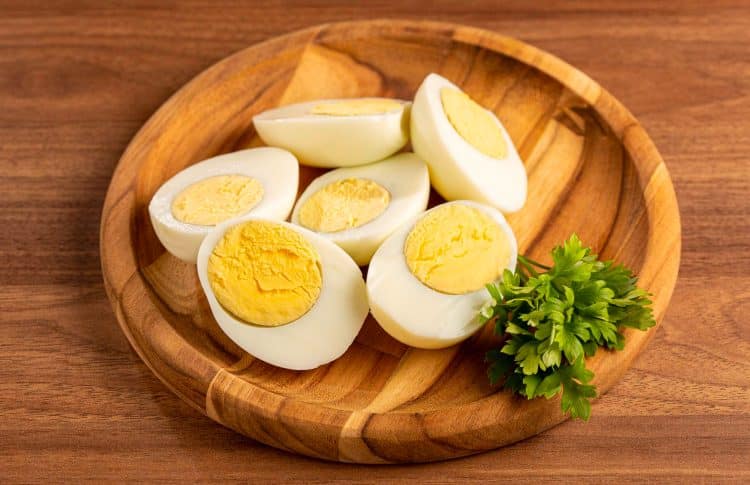
The hard boiled egg diet is a short-term diet centered around consuming hard-boiled eggs. The diet has several variations:
Traditional:
The boiled egg diet’s traditional version is a variation of the Atkins diet. You do not have to limit yourself to eggs on this version, but most of your protein will come from this source. Carbohydrate intake is restricted. This version requires two or more eggs, a low-carb veggie, and fruit for breakfast. You may also consume lean protein in place of a low-carb veggie. Lunch might consist of a lean protein source or another serving of eggs.
Typically, chicken or fish are included. More eggs or lean proteins like fish or chicken will be served for dinner. You can have as many low-carb veggies and salads as you like on this diet. One or two portions of fruit are allowed daily, and carbohydrate intake is closely regulated, so you’ll eliminate foods like bread, pasta, and potatoes.
Read also: 14-Day Boiled Egg Diet: Should You Try It?
Egg and Grapefruit Diet:
The egg and grapefruit diet involves consuming half a grapefruit per meal. Apart from that, it is similar to the traditional boiled egg diet. Grapefruit is believed to accelerate weight loss. It is an extremely nutrient-dense fruit that is especially high in vitamins A and C, potassium, and folate. It is also very high in fiber and low in calories. Adding grapefruit will compensate for the low fiber content of the other versions of the boiled egg diet.
Egg Only Diet:
This is the most extreme version of the diet, requiring you to eat nothing but eggs and water (which may be infused with electrolytes). In this diet version, eggs may be boiled, scrambled, or poached. This diet does not represent a balanced form of eating, as it is very low in fiber. It is a very restrictive diet that can be maintained for a short period. Most people usually follow this diet for a week.
Egg Diet Pros
Here are the benefits of the egg diet:
- Reduced Hunger: A high-protein, low-carb diet can suppress hunger, making you feel fuller even when dieting.
- Faster Calorie Burn: You’ll burn calories more quickly due to the greater protein content.
- Vitamins: Eggs are a rich source of vitamins in addition to being a wonderful source of protein.
- Weight Loss: Eggs, particularly during breakfast, are proven to accelerate weight loss.
Egg Diet Cons
These are the disadvantages of adopting the egg diet:
- Not a Balanced Diet: This is not a balanced way of eating because it cuts out whole food groups, including many vegetables.
- Low Carbohydrate Intake: Lack of carbohydrates might make engaging in any intense activity challenging, especially at the beginning.
- Nausea: Many dieters experience nausea and exhaustion for the first few days. This is because the body must adjust to reduced carbohydrate consumption.
- Boring: Since you consume the same foods daily, you can easily become bored while on the diet, making it difficult to maintain.
Benefits of Eating Eggs
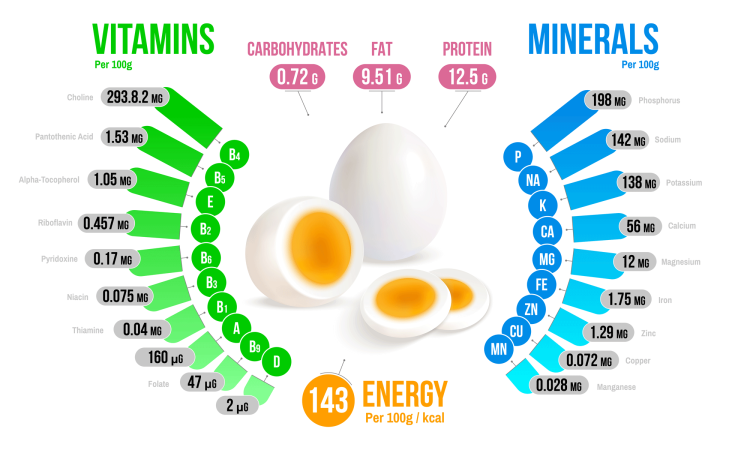
There are many health-related benefits of eating more eggs. Here are seven reasons to up your egg intake:
Eggs are Nutrient Rich
Vitamins A, D, B-6, and B-12 are some of the essential vitamins and minerals found in eggs. Iron, calcium, and magnesium are also present. 10% of the recommended daily intake of vitamins B-12, A, B-6, B-3, and D can be found in one boiled egg. It also has 2% of your daily iron and calcium requirements.
Eggs are a Superior Form of Protein
Chicken eggs contain more than six grams of protein per egg. The protein content of one egg is equal to around thirty grams of meat, making it a higher-quality protein option. Additionally, the protein content of eggs is considered greater than that of chicken or beef, and they are also considerably more affordable than those foods.
Eggs have one of the highest biological values of any protein source. That means they contain all the essential amino acids in the right proportions. This makes them more readily available for protein synthesis, leading to greater muscle gains and post-workout tissue repair.
The protein in eggs is easily digestible, so it can be quickly broken down and absorbed into the body. The body can use the amino acids more effectively thanks to this digestibility.
Improved Eyesight
Your eyesight will deteriorate with time, a condition known as macular degeneration. Lutein and zeaxanthin, two essential nutrients abundant in eggs, are present in the eyes and help protect them. If you’re concerned about your eyesight, eggs are a terrific addition to your diet as they can help to shield them from harmful light wavelengths.
Balanced Blood Sugar
Eggs’ combination of protein and fat will help maintain stable blood sugar levels. If you have diabetes, this may help avoid problems because such issues raise blood sugar levels. Remember that eggs won’t boost your cholesterol if you’re following a low-carb diet. Eggs can help gradually lower your total cholesterol when you follow a low-carb diet. As a result, especially when considering the advantages of weight loss, this can aid in lowering the risk of heart disease.
Brain Health
A nutrient called choline, abundant in eggs, is crucial for your mental well-being. It promotes brain development as well as memory activation. It’s also vital for pregnant women because a growing child will cause a mother’s choline levels to drop dangerously low. According to estimates, as many as 90% of people have low choline levels. Therefore, you are doing your brain a huge favor by giving it a nutrient it sorely needs by eating eggs.
Promotes a Feeling of Fullness
Eggs do a great job of filling you up, helping control your caloric intake. As we’ve already discovered, eggs are a fantastic source of high-quality protein. Protein can aid in lowering appetite and boosting feelings of fullness because it is more satiating than carbohydrates or lipids. The amino acids in eggs promote the release of hormones that signal to the brain that you are full.
The essential amino acids in eggs promote a feeling of fullness. The rich supply of nutrients in eggs also helps control appetite and advance general health. Eggs take longer to digest since they include more protein and fat. This gradual digestive process enables you to feel satisfied for extended periods and can minimize blood sugar spikes, which can cause cravings and increased hunger.
Hair, Nail, and Bone Health
Eggs are great for the health of your hair, bones, and nails, especially if you cannot consume dairy products. That’s because eggs will boost your calcium and vitamin D levels. Eggs are also rich in omega-3 fatty acids, which also support your hair, nail, and bone health.
Is It Best To Eat Scrambled Eggs or Hard Boiled?
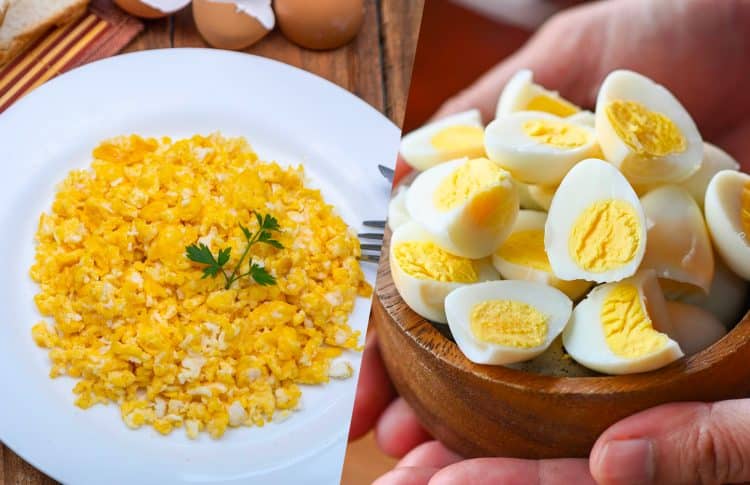
The name of this diet is the hard-boiled egg diet, which leads to the question, ‘Why hard-boiled?’ After all, one of the benefits of eggs is that there are so many ways to cook them, helping to prevent eating monotony. So, is there a reason why you should stick to hard-boiling your eggs on this diet?
To answer that question, let’s consider the best way to cook an egg to preserve its nutritional goodness. We first need to appreciate that fats oxidize when heat is applied. This can potentially turn good fats into bad fats. Eggs contain a lot of good fats, so we don’t want to do anything that will take away from that goodness. Excessive heat can also damage the micronutrients contained in the egg.
So, with these points in mind, let’s look at the various way you can cook eggs:
Hard-Boiled
Hard-boiled eggs are the winner in terms of convenience. They require minimal work to cook and provide a convenient snack you can take with you when you’re away from home. Hard boiling also lets you leave the shell and the protective membrane on as you cook the egg. This will help to protect the nutrients and the fats from the heat that is applied.
Soft-Boiled
The difference between a soft-boiled and a hard-boiled egg comes down to timing. With a soft-boiled egg, you reduce the time under heat, so the yolk remains runny. As a result, you are applying less heat, which further protects the fats and micronutrients from damage. In fact, because you are not really cooking the yolk, its contents will not have a detrimental effect.
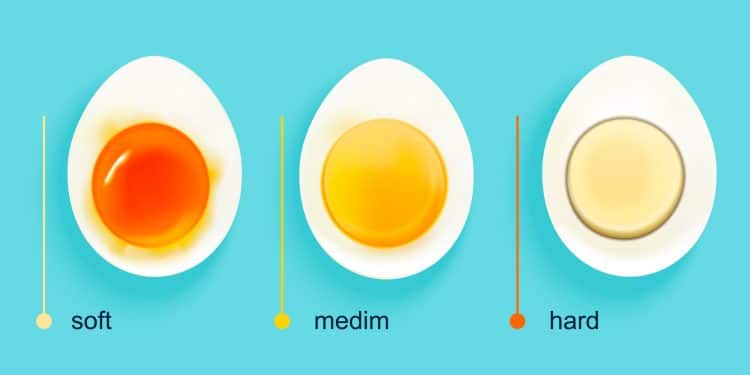
Poached
Poaching eggs well is a skill that takes time to acquire. It involves filling a saucepan with 2-3 inches of water and heating it to a gentle simmer. You then crack the egg into a small bowl and slide it into the simmering water. Cook the egg for 4-6 minutes for a soft yolk and 7-8 minutes for a hard yolk.
Poaching is an excellent way to cook your eggs, as it reduces the heat applied to the yolk.
Scrambled
Scrambling is probably the most popular way to eat eggs. However, from a nutrient point of view, it’s also the worst way. That’s because you are applying a lot of heat to the mixed-up egg from every angle. This can potentially destroy some micronutrients and convert good fats into bad.
Over Easy
Over-easy cooking involves putting the egg in a frying pan and cooking it on both sides. This method also applies a lot of heat to the egg, providing a greater chance of damaging the micronutrients within the yolk.
Sunny Side Up
Sunny side up involves only cooking the egg on one side. This is a healthier way to cook the egg as it means leaving the yolk in a close to raw state. Because you’re not applying a lot of heat to the yolk, you won’t destroy its micronutrients and fats.
Raw
Eating raw eggs ensures you’re not destroying any of the micronutrients or fats. However, you are missing out on the advantage of heat, which effectively eliminates bacteria such as salmonella. This risk, though, is minimal, especially if you store your eggs properly.
To summarize, we can list different ways of cooking eggs based on their nutritional value, ranking them from the most beneficial to the least.
- Soft-boiled
- Hard-boiled
- Raw
- Sunny side up
- Over easy
- Poached
- Scrambled
When it comes to the hard-boiled egg diet, there is no particular benefit to hard boiling rather than soft boiling, apart from the convenience factor (it’s easier to eat a hard-boiled egg on the run than a soft-boiled one). Feel free to use either method to prepare your eggs.
Here’s how to boil an egg to ensure you end up with your preferred level of hardness:
- Add enough water to a pot to cover an egg by about an inch
- Place the egg in the pot and bring it to a boil
- Reduce the heat to a gentle simmer
- Cook for:
- Four minutes if you want a runny yolk
- Five minutes for a slightly firmer yolk
- Six minutes for a yolk that is almost set
- Transfer the eggs to a bowl of cold water until it is cool enough to handle
Why You Lose Weight on the Hard-Boiled Egg Diet
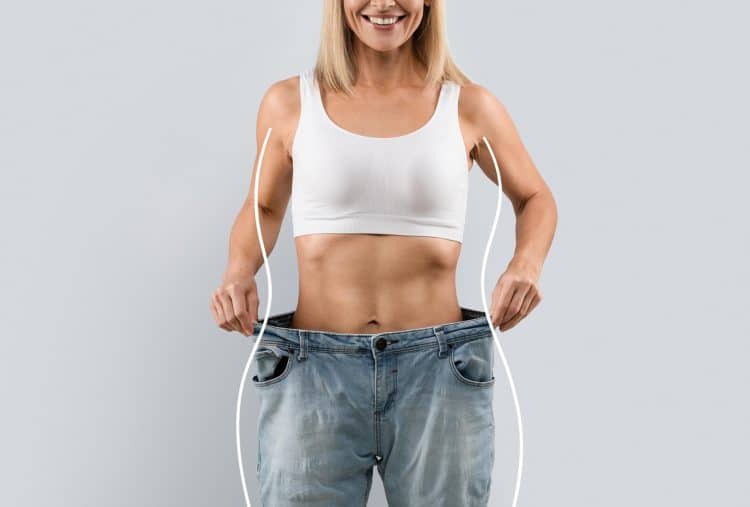
Proponents of the boiled egg diet do not claim that eggs have any magical weight loss properties. Still, many cases of extreme fat loss are reported online from following this diet. By extreme, I mean up to 20 pounds in two weeks.
Not all that weight loss, however, will be fat loss. Our bodies can store fats and carbohydrates. When we store carbohydrates, we also hold water. Those carbohydrates are used to fuel exercise and other daily activities. We can lose weight quickly when we cut back our carbohydrate intake. Much of that weight loss, though, will be water.
Here’s what a typical day of following the hard-boiled egg and diet might look like:
- Meal One: Two hard-boiled eggs and a piece of fruit
- Meal Two: Green vegetables and chicken salad
- Meal Three: Chicken and salad
The first thing you’ll notice here is that this is not a lot of food. In fact, if you were to calculate the calorie content of the above three meals, it would come out at less than 1,000 calories for the entire day. That is an extremely low total, especially for active people.
The daily carbohydrate content is also extremely low on this diet. As a result, you will see quite a dramatic reduction in the amount of fluids held in your body if you follow this eating plan.
Most people following a weight loss diet will increase their activity levels. They may begin a workout program at the gym or simply start using the stairs rather than the elevator at work or parking their car a couple of blocks away from their work location. This will help with the calorie burn that ensures that they maintain a daily caloric deficit, which is the key to weight loss.
The hard-boiled egg diet’s effectiveness in quick weight loss is undeniable. However, the main reason for the weight loss is not that you’re eating eggs, even though they are extremely healthy, but that you are dramatically cutting back on your calorie intake. Most people require 2,000 or more calories daily to maintain functionality. The hard-boiled egg diet cuts that number in half. This creates a daily caloric deficit of over 1,000 calories, forcing your body to turn to stored body fat reserves to make up the energy difference.
The hard-boiled egg diet is meant to be a short-term intervention, with most people only sticking with it for a couple of weeks. And that is its biggest problem. It is not a sustainable diet because it involves such a dramatic calorie reduction. Most people will regain the lost weight, and then some, after going off the diet.
When you take in fewer calories and, at the same time, increase your energy levels, your metabolism adjusts so that it becomes more efficient at not burning calories. This is part of the body’s built-in survival mechanism. So, when you go on an ultra-low calorie diet, such as the hard-boiled egg diet, your metabolic rate will adapt, so you burn calories slower.
What do you think will happen when you go off the diet?
When you return to your pre-diet caloric intake, you will see rapid weight regain. Your slowed-down metabolism will not be able to cope with the high caloric intake that it is now experiencing. As a result, more and more calories will be stored as body fat, and you will end up heavier than when you began the diet.
Hard-Boiled Egg Diet vs. 36 Eggs a Day Diet
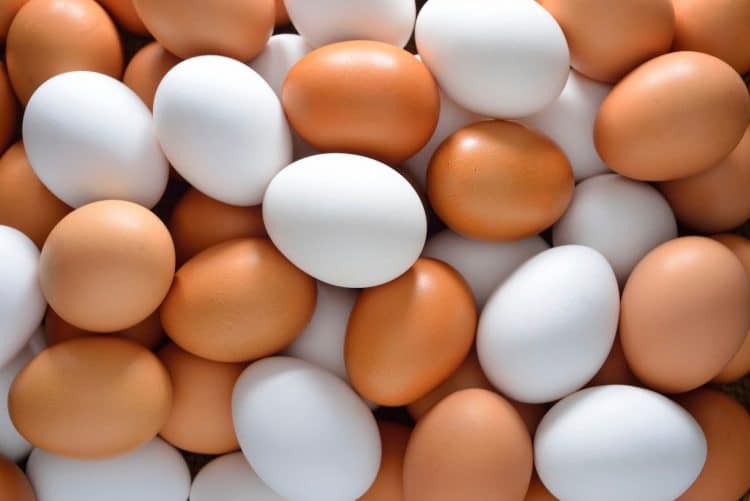
While the hard-boiled egg diet has gained traction over the past few years, another egg-based diet has been popular, especially among bodybuilders, for decades — the 36 eggs-a-day diet.
When I first heard of the hard-boiled egg diet, I thought it was a version of the 36 eggs-a-day diet. You may have thought the same thing. So, to avoid confusion, let’s see how the 36-eggs-a-day diet differs from the hard-boiled egg diet.
The 36 eggs-a-day diet was promoted in the 1970s by legendary bodybuilding trainer Vince Gironda. Known for his unconventional training methods (he banned squats from his gym) and nutrition advice, Vince reportedly said that eating 36 eggs daily was as beneficial in building muscle as going on a Dianabol cycle.
Vince referred to his diet as the hormone precursor diet. It was designed to do the following:
- Get you in a state of positive nitrogen balance
- Put 30-50 grams of protein into your body every three hours
- Release the precursor hormones to put you in an anabolic state
Vince was aware that cholesterol, which eggs contain a lot of, is a precursor that is a building block for growth hormone and testosterone. The high-quality protein in eggs also helps put you in a positive nitrogen balance.
Vince believed that the best way to consume eggs was raw. So, rather than eating the eggs, he had his athletes drink them as a special shake. The shake contained 12 raw eggs and was consumed three times per day.
Here’s the full contents of the raw egg shake:
- 12 oz (360 ml) half-and-half milk
- 12 raw eggs
- ⅓ cup of milk and egg protein powder
- 1 banana
This shake is to be consumed for breakfast and then between your lunch and dinner meals. Lunch and dinner would consist of a palm-sized serving of meat and a salad.
Vince also advocated the use of the following supplements on this diet:
- Zinc
- Multivitamins
- Kelp
- HCL
- Digestive enzymes
- Liver tablets
Apart from the small amount in the banana and your lunch and dinner salads, this diet has no carbs.
There is some scientific backing for this diet. In a 1975 study, doctors put severe burn patients on a diet consisting of 35 eggs per day. None of the patients suffered negative side effects. They all experienced normal serum protein levels more quickly than patients in the control group. The researchers concluded that a high-protein diet is safe for treating severe burns. [1]
The 36-eggs-a-day diet should be followed for six to eight weeks. You then switch to a vegetarian detox diet for a week before resuming your normal eating pattern. While Vince advocated the diet for hard gainers, he also promoted it as a way for advanced bodybuilders to break out of a muscle plateau.
Key Differences Between the 36-eggs-a-day and Hard-Boiled Egg Diets
Here are the differences between the two egg diets:
- 36 eggs a day is primarily for muscle gain
- The hard-boiled egg diet is mainly for weight loss
- 36 eggs a day diet has you drink raw eggs
- The hard-boiled egg diet has you cook the eggs
- The hard-boiled egg diet is shorter, usually lasting no longer than two weeks, compared with six to eights weeks on the 36 eggs-a-day diet
How to Succeed on the Hard-Boiled Egg Diet
As we’ve seen, the major problem with the hard-boiled egg diet is not the fact that you’re eating eggs but that your total daily caloric intake is simply too low. But it doesn’t have to be that way. By increasing your daily food intake, while still focusing on eggs, citrus fruits, vegetables, and lean proteins, you will be able to find success on this diet. While your weight loss will not be as dramatic as it would be if you were eating less than 1,000 calories a day, your weight loss will be far healthier and more sustainable.
You need to make the following two key adjustments for the hard-boiled diet to be successful:
Track your Calories
Your first step in planning a healthy hard-boiled egg diet should be calculating your current caloric maintenance level. This figure, also known as your total daily energy expenditure (TDEE), tells you how many calories you must consume daily to meet your energy needs. There are several formulae that you can use to work this out. However, the easiest way is to use an online calculator such as this one.
Once you know your total daily energy expenditure, you should reduce that figure by 500 calories. This will ensure that you end each day with a caloric deficit. To meet your daily energy demands, your body will have to call on its stored fat energy reserves. Reducing your daily food intake by 500 calories is safe and sustainable.
Now that you know how many calories you need to consume each day, it is up to you to track those calories. Don’t just leave it to chance. You can use online food tracking apps like MyFitnessPal to track your calories and protein, carbohydrate, and fat intake.
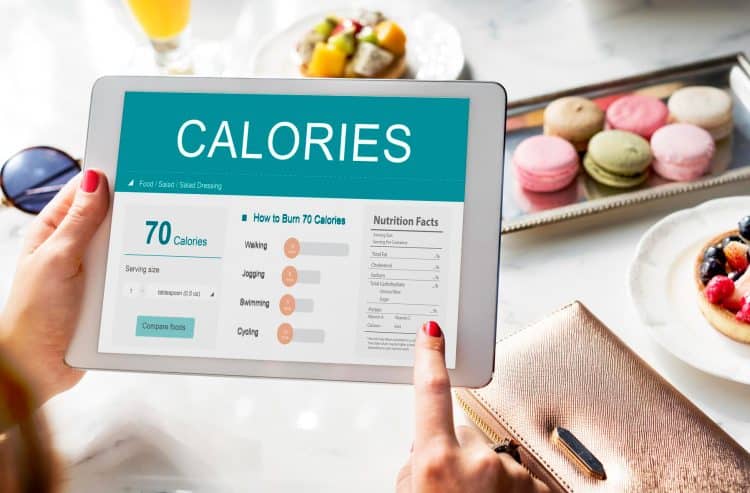
Rebuild Your Caloric Intake
By reducing your daily caloric intake less dramatically, you can sustain the hard-boiled diet for longer. While most people only stay on this diet for 14 days, you should be able to do so for at least six to eight weeks when you reduce your intake by 500 calories per day.
Even though you are only reducing your daily caloric intake by 500 calories, your metabolism will still slow down. If you suddenly return to your maintenance calorie level when you finish the diet, you risk unwanted weight gain. That is why you should slowly return to your pre-diet calorie intake.
For example, if your daily maintenance caloric intake is 2,500, you should consume 2,000 calories daily on the hard-boiled egg diet. Rather than going straight back up to 2,500 calories, you should increase by 50-100 calories per day for the first week. Then, continue adding another 50 calories daily for each passing week. By doing this, after 10 weeks, you will have returned to your maintenance level. Slowly transitioning back up in this manner will give your body the time needed to readjust your metabolism. This strategy will help you avoid the rebound weight gain that plagues so many dieters.
What Type of Egg To Use on a Hard-Boiled Egg Diet
While most people use chicken eggs for the hard-boiled egg diet, other options exist. Here’s an overview of the various types of eggs available and their benefits:
Brown Chicken Eggs
You’ve probably seen brown eggs on the supermarket shelf. You may have also noticed that brown eggs are considerably more expensive than white ones. The difference between the two comes down to the breed of chicken producing the egg.
Brown eggs as produced by the Marans, Reds, Sussex, and Plymouth Rock breeds. All of these breeds have brown feathers and produce eggs with brown shells. White eggs are laid by chickens with white feathers, such as White Rocks and Leghorns.
Despite the price difference, Brown and white chicken eggs have no major nutrition differences. The macro and micro nutrient content does not change depending on the color of the eggshell.

Omega-3 Enriched Chicken Eggs
Eggs promoted as omega-3 enhanced have been laid by chickens fed a diet rich in omega-3 fatty acids. Omega-3s are a type of polyunsaturated fatty acids that provide a wide range of health benefits, including controlling inflammation, improving brain power, and enhancing heart health.
Omega-3-enriched chickens are fed with foods like flaxseed, algae, and fish oil. This increases the omega-3 content of the eggs they lay. The eggs will be especially high in alpha-linolenic acid (ALA), eicosapentaenoic acid (EPA), and docosahexaenoic acid (DHA).
The amount of omega-3 fatty acids in these eggs can change according to how the chickens are fed. Check the nutritional label to identify the exact omega-3 content.
Vegetarian Chicken Eggs
If you notice the vegetarian label on an egg carton, it signifies that no animal protein was given to the hens who laid the eggs. This may sound good for you, but it’s not. A hen is naturally not vegetarian because its diet typically includes insects and worms.
Duck Eggs
Duck eggs tend to be bigger than chicken eggs in size. Compared to chicken eggs, their shells are a bit thicker and harder, which might make them stronger but harder to shatter.

Here is a comparison of the nutritional content of chicken and duck eggs:
Chicken Egg:
- Calories: 71
- Total Fat: 5 Grams
- Cholesterol: 211 mg
- Carbs: 0 Grams
- Sodium: 70 mg
- Protein: 6 Grams
Duck Eggs:
- Calories: 130
- Fat: 10 Grams
- Cholesterol: 619 Grams
- Carbs: 1 Gram
- Sodium: 102 mg
- Protein: 9 grams
Duck eggs typically have larger yolks than chicken eggs. They also have around double the fat content and a third more protein. In addition, their levels of micronutrients like selenium, vitamin D, and vitamin B12 are higher. The cholesterol level in duck eggs is often higher than that of chicken eggs.
Although there are notable differences between chicken and duck eggs, they have comparable nutritional profiles.
Duck eggs have a distinctive flavor that is richer and creamier than chicken eggs. Duck eggs’ yolks have a deeper flavor and a slightly different texture since they are bigger and contain more fat. While some people prefer the taste of duck eggs, it may be too strong for others.
Duck and chicken eggs can be substituted in many dishes, but there are several key distinctions to remember. Duck eggs are frequently preferred in baking and pastry preparation because of their bigger size and higher fat content. Some baked foods can contribute to a richer texture and help produce a higher rise. Custards, puddings, and other desserts frequently use duck eggs as an ingredient. However, the availability and adaptability of chicken eggs make them more popular in regular cooking.
Some people may find that duck eggs are more tolerable for them than chicken eggs. Duck eggs can trigger allergies in some people, so those with egg allergies should proceed cautiously. Duck eggs are more expensive than chicken eggs because of limited supply and greater production costs.
You should give duck eggs another one to two minutes in hot water when boiling because they naturally have a thicker shell and are larger.
Organic Eggs
Organic eggs are promoted as being healthier than standard eggs. As a result, they command a significantly higher price. However, there are variations among organic labeling. You can’t just assume that since something is labeled organic, it is healthy. A few labels the USDA allows to describe an organic product are ‘one hundred percent organic,’ ‘ninety-five percent organic,’ and ‘created with organic ingredients.’
If a carton of eggs is marked organic, you know it was produced in an environment free of pesticides, fungicides, herbicides, and synthetic fertilizers. However, “organic” won’t tell you anything about your hen’s living conditions or nutritional worth. In other words, just because you buy organic eggs doesn’t guarantee they are more nutrient-dense. All you can be sure of is that they won’t have any pesticide traces.
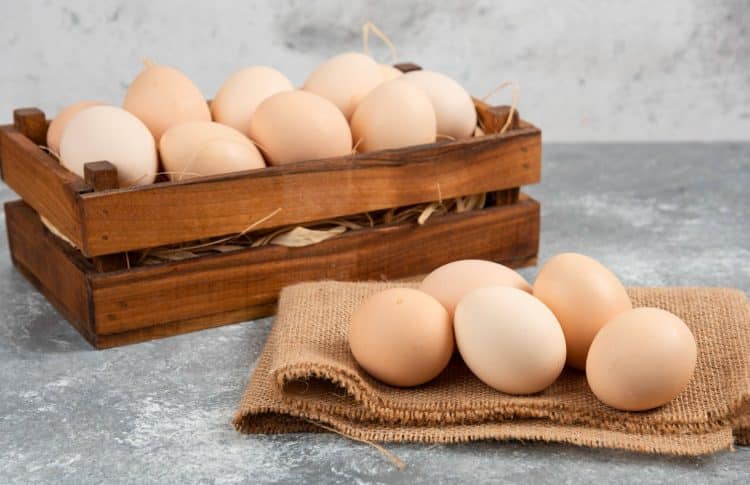
What is the Grade of an Egg?
Grading systems, which may differ between countries, are used to rate the appearance and quality of eggs. The Department of Agriculture (USDA) established the USA’s grading system. It is based on the following grades:
Grade AA:
Grade AA eggs are the best in terms of look and quality. The shell must be unscratched, intact, and without leaks or cracks. The air cell, or pocket of air, should be small and not deeper than 1/8 inch at the wide end of the egg. The egg white has to be crystal clear, solid, and barely spread. The yolk should be solid, spherical, and either slightly off-center. The egg should be neat and appealing in terms of aesthetics overall.
Grade A:
While Grade A eggs are still of great quality, they might not seem quite as flawless as Grade AA eggs. The shell must be undamaged and clean. Small imperfections or stains are acceptable but should be kept to a minimum. The air cell may be slightly bigger than in Grade AA eggs, but it shouldn’t be deeper than 3/16 inches. The egg white should be moderately distributed, transparent, and firm. The yolk should be solid and spherical, but it can be slightly off-center or flattened. The egg should have a respectably tidy and decent appearance overall.
Grade B:
Grade B eggs are generally not offered as table eggs in stores because of their poor quality. They are frequently employed in processed egg goods or industrial settings. The shell may be rough, have little fissures, or both. The air cell may be larger than Grade AA or Grade A eggs. The egg white may be more evenly distributed and thinner, and the yolk may be more delicate and flatter. Compared to Grade AA or Grade A eggs, Grade B eggs are less aesthetically pleasing.
It’s important to remember that the grading standards primarily evaluate the outside quality and do not point out variations in nutritional value or flavor. Eggs of all grades can be equally nutrient-dense and safe for ingestion. Check the carton when buying eggs for the grade, usually marked on the box. Before choosing, look for any indications of damage or abnormalities in each egg.
Freshness is another important factor to consider when buying eggs. Check the carton for the Julian date, which is the date the eggs were packed. The closer it is to that date, the fresher the eggs.
Where to Store Eggs

Should eggs be kept on the kitchen counter or in the refrigerator? While most individuals worldwide keep their eggs in their pantry or on the counter, most Americans keep them in the refrigerator. The main distinction is that Americans often wash their eggs and store them in refrigerators to prevent salmonella.
Salmonella can be transferred to eggs in one of two ways:
- From a contaminated hen
- From poop
To ensure there are no feces on their eggs, Americans have a habit of washing them after returning from the shop. By doing so, however, they unintentionally reduce the egg’s safety. The cuticle is a coating of proteins and other substances that protects eggs. Salmonella cannot enter the egg through the permeable shell because of this built-in defense mechanism. This barrier is removed by washing the egg.
In Europe, egg washing is avoided to prevent cuticle loss. In contrast to the USA, many European nations also immunize their hens against salmonella. Salmonella contamination in American eggs is, therefore, more likely.
Bacterial growth is slowed by refrigerating the eggs. According to research, eggs with salmonella contamination, whether on the outside or inside, will become dangerously contaminated after three weeks of storage at room temperature. However, even after six weeks of storage in the fridge, there won’t be much bacterial development. [2]
So, let’s return to our original query — should eggs be refrigerated?
Store eggs at room temperature if they have not been washed and have received a salmonella vaccination. Condensation may accumulate on the shell of an egg when you retrieve it from the refrigerator. The resulting wetness promotes the growth of bacteria, which may penetrate the porous shell.
You should keep your eggs in the refrigerator if you live in the United States or another country where you buy them from the grocery store’s refrigerated section.
Hard-Boiled Egg Diet Tips
I have personally tried the hard-boiled egg diet, both in its strictest form and in the more traditional version. This has given me insight into the practicalities of the diet and how it can be modified to make it more user-friendly. Here are half a dozen tips that I’ve come up with:
- Don’t limit yourself to hard-boiled eggs. Include soft-boiled, poached, and raw eggs if you can handle them.
- Only reduce your calories by 500 calories below your maintenance level.
- Add vegetables to the diet, including cucumbers, tomatoes, and leafy greens. This will ensure that you’re getting a sufficient amount of fiber.
- Count your calories with the help of an app like MyFitnessPal; don’t leave it to guesswork.
- Use hard-boiled eggs as a snack when you are away from home.
- Add chopped-up hard-boiled eggs to your salads
FAQs
Is the hard-boiled egg diet expensive?
No, the hard-boiled egg diet is not considered an expensive diet compared to other diet options. The bulk of your protein will come from eggs, which are relatively inexpensive. If you follow the eggs-only diet version, you will probably find that your shopping bill will be dramatically reduced. Yet, even the traditional version will reduce your food bill as the other foods you eat are relatively inexpensive (such as fruits and vegetables).
Should you eat fats on the boiled egg diet?
Yes, you should consume fats on the hard-boiled egg diet. Fortunately, eggs themselves are a healthy source of fat, especially omega-3 fatty acids. This source of fatty acids has been shown to positively impact heart health, reduce triglyceride levels, and lower blood pressure. They also have cognitive benefits. A type of omega-3 fatty acid called docosahexaenoic acid (DHA) is a component of brain tissue and is vital for brain function and memory.
You can buy eggs that are omega-3 enriched. These are more expensive than standard eggs but will provide a higher amount of essential fatty acids.
If you are following the traditional version of the boiled egg diet, you can get extra fats by consuming avocados, nuts, olive oil, and fatty fish. You can also consume grass-fed butter and sugar-free mayonnaise.
Can I have any sweeteners on the hard-boiled egg diet?
No, you should not add sweeteners to any version of the hard-boiled egg diet. However, if you follow the traditional version, you will get natural sweeteners in the form of fructose in the fruits you consume. You should, though, limit your fruit intake to control fructose content. I recommend limiting your intake to three pieces of fruit per day.
Will I get constipation or diarrhea on the hard-boiled egg diet?
You might experience some digestive discomfort on the hard-boiled egg diet, including constipation or diarrhea. This is due to the diet’s high protein, low carbohydrate nature.
You increase the likelihood of constipation when you restrict your fiber intake and increase your protein intake, as you do on the hard-boiled egg diet. Fiber, which is abundant in whole grains, vegetables, and fruits, plays a big part in controlling your bowel movements. To avoid this, you should make sure that you are getting an adequate amount of fiber. You can do this by adding citrus fruits, vegetables, and nuts to your diet. You should also stay well hydrated, drinking at least half a gallon (around two liters) of water daily.
When you drastically change your food intake, especially one that involves increasing your protein intake, you may experience diarrhea. This should only last a day or two as your body adjusts to your new diet.
How long does the hard-boiled egg diet last?
The length of the hard-boiled egg diet will depend on the version of the diet you follow. If you follow the strict egg-only version, you should not go beyond one week on the diet. That’s because this version is nutritionally unbalanced, and doing it for longer than a week may be dangerous. The traditional version of the diet is usually followed for two weeks.
Summary
The hard-boiled egg diet can help you lose weight and keep it off, but only if you follow it smartly. By reducing your caloric intake by no more than 500 calories, adding leafy green vegetables to get the needed fiber, and gradually rebuilding your caloric intake as you come off the diet, you can avoid the metabolic reset that leads to weight regain.
Why not try the hard-boiled egg diet — you’ve got nothing to lose but those unwanted pounds!
Research
- Hirshowitz B, Brook JG, Kaufman T, Titelman U, Mahler D. 35 eggs per day in the treatment of severe burns. Br J Plast Surg. 1975 Jul;28(3):185-8. doi: 10.1016/0007-1226(75)90127-7. PMID: 1191862.
- Khan S, McWhorter AR, Moyle TS, Chousalkar KK. Refrigeration of eggs influences the virulence of Salmonella Typhimurium. Sci Rep. 2021 Sep 9;11(1):18026. doi: 10.1038/s41598-021-97135-4. PMID: 34504138; PMCID: PMC8429434.
